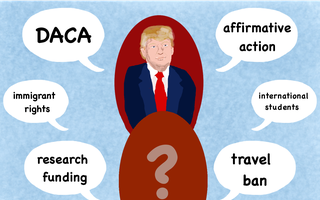{shortcode-ce2eeb61660b0efbb5dbe84edf67c8b2d2141608}
For months, Drew G. Faust had successfully courted Harvard big-wigs in backroom hotel meetings, bested hundreds of competitors, and dodged reporters in her quest to become Harvard’s 28th president. But she faced one final hurdle: a faulty parking lot gate.
It was February 2007, and she and University General Counsel Robert W. Iuliano ’83 were trapped in a car in the parking lot of the Doubletree Hotel. Their anxiety mounted by the minute.
Faust, then the dean of the Radcliffe Institute for Advanced Study, was slated to teach an undergraduate seminar on the Civil War—and if she didn’t make it back to campus in time, she feared students would discern the reason: she had just been offered the Harvard presidency.
The rendezvous at the Doubletree was Faust’s final meeting with the presidential search committee. After the committee—composed of the entire Corporation and three members of the Board of Overseers—picked Faust from a slate of 750 candidates, she had to wait a week until the Overseers could formally vote to confirm her.
In the meantime, rumors were swirling. The Crimson had reported that Faust’s name had risen to the top of the search committee’s short list. Too much time in the parking lot could’ve fueled further speculation.
"The thing wouldn't lift, and we thought ‘It’s gonna blow our cover. Because when she’s late for class, everyone who’s so suspicious anyway is going to think, aha!’” Faust said in an interview Wednesday, reflecting on what she laughingly referred to as the “ridiculous search” leading up to her appointment.
Now, with ten years of the presidency under her belt, Faust is on her way out, and the hunt is on for her replacement. Harvard’s presidential searches are famous for their secrecy, as the search committee endeavors to fend off national media scrutiny and Crimson reporters in pursuit of a scoop.
The Crimson broke the news from an airplane over New England when the 1991 search committee picked Neil L. Rudenstine. Crimson reporters similarly reported that Lawrence H. Summers was Harvard’s 27th president two days before the Board of Overseers confirmed him in 2001. So during the 2006 search, Faust said she had to resort to “various devious methods of avoiding The Crimson.”
En route to her final interview on Superbowl Sunday, Faust said the search committee instructed her to walk down JFK Street with her husband and her dog, then slip through the Garage—an indoor shopping complex—to evade reporters. She was told to exit onto a side street, where she would be “swept off” in a waiting car to the downtown Boston office of senior fellow of the Corporation William F. Lee ’72, then an Overseer. Shortly after that meeting, she was offered the job at the Doubletree Hotel.
Crimson reporters weren’t the only ones left in the dark. Faust had to keep the news even from her daughter, Jessica Rosenberg, who was then a fact-checker at The New Yorker.
"All the people on The New Yorker were constantly saying ‘what have you heard? Is your mother going to be president? What’s going on?’ And I wanted to have her have plausible deniability,” Faust said, adding that she vaguely told her to “bring some decent clothes” when she came to Boston that weekend.
Still sworn to secrecy, she traveled to Bryn Mawr College, her alma mater, for a board meeting. But in the days leading up to the Overseers vote, The Crimson and several other news outlets reported that the search committee had settled on Faust.
"I got on my airplane in Philadelphia, and the people on the airplane burst into applause when they saw me,” she recalled. “And then finally the next day the Overseers voted—and I could speak again."
A decade later, as she contemplated leaving the post, Faust found herself in stealth mode yet again. With the end of the University-wide capital campaign nearing, she said the idea of stepping down had been “kind of jelling in my brain.”
“It seemed to me that the next stage of planning for the University, planning for fundraising, planning for the future, should be done by the person who’s going to execute on it—and I wasn’t going to,” she said. “Someone said to me at one point, ‘you ought to stay for another seven years, or one year.’ You know, it’s either make the plan and follow it out, or get out of the way for somebody else to do it.”
But once she made up her mind to bow out, she said she had to keep her decision quiet. She told Lee in the spring, and Vice President for Public Affairs and Communications Paul Andrew soon after so he could pull together the announcement. On June 14, Faust made her decision to step down next summer public.
That evening, she held an impromptu celebratory event with friends and colleagues at Elmwood, the president’s residence. Nearly 30 people stopped by for drinks and well-wishing, she said.
“It was just emotional and sweet and very moving for me, very gratifying that people were being appreciative,” she said.
Now, as her tenure as president draws to a close, Faust said will focus on a number of her remaining priorities—including wrapping up the capital campaign, implementing recommendations by a task force on inclusion and belonging, and continuing federal advocacy in Washington. Meanwhile, the committee charged with finding her replacement has begun meeting, once again behind closed doors. Faust will stay out of the process, though.
"I think it’s very important that I not be involved in the search process because this is to be another administration, another regime,” she said. “I've had my wonderful experience and it’s now in the hands of the Fellows and the search committee."
—Staff writer Claire E. Parker can be reached at claire.parker@thecrimson.com. Follow her on Twitter @ClaireParkerDC.
—Staff writer Leah S. Yared can be reached at leah.yared@thecrimson.com. Follow her on Twitter @LeahYared.Read more in News
Political Groups Promote Student Voter Engagement

















